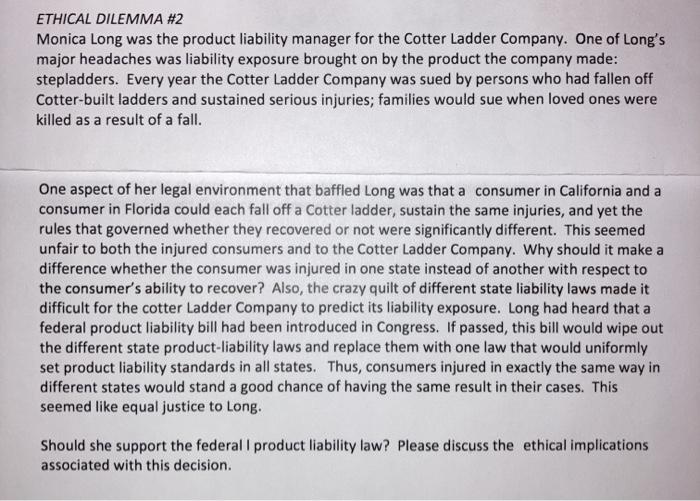ETHICAL DILEMMA #2 Monica Long was the product liability manager for the Cotter Ladder Company. One of Long's major headaches was liability exposure brought on by the product the company made: stepladders. Every year the Cotter Ladder Company was sued by persons who had fallen off Cotter-built ladders and sustained serious injuries, families would sue when loved ones were killed as a result of a fall. One aspect of her legal environment that baffled Long was that a consumer in California and a consumer in Florida could each fall off a Cotter ladder, sustain the same injuries, and yet the rules that governed whether they recovered or not were significantly different. This seemed unfair to both the injured consumers and to the Cotter Ladder Company. Why should it make a difference whether the consumer was injured in one state instead of another with respect to the consumer's ability to recover? Also, the crazy quilt of different state liability laws made it difficult for the cotter Ladder Company to predict its liability exposure. Long had heard that a federal product liability bill had been introduced in Congress. If passed, this bill would wipe out the different state product liability laws and replace them with one law that would uniformly set product liability standards in all states. Thus, consumers injured in exactly the same way in different states would stand a good chance of having the same result in their cases. This seemed like equal justice to Long. Should she support the federal l product liability law? Please discuss the ethical implications associated with this decision. ETHICAL DILEMMA #2 Monica Long was the product liability manager for the Cotter Ladder Company. One of Long's major headaches was liability exposure brought on by the product the company made: stepladders. Every year the Cotter Ladder Company was sued by persons who had fallen off Cotter-built ladders and sustained serious injuries, families would sue when loved ones were killed as a result of a fall. One aspect of her legal environment that baffled Long was that a consumer in California and a consumer in Florida could each fall off a Cotter ladder, sustain the same injuries, and yet the rules that governed whether they recovered or not were significantly different. This seemed unfair to both the injured consumers and to the Cotter Ladder Company. Why should it make a difference whether the consumer was injured in one state instead of another with respect to the consumer's ability to recover? Also, the crazy quilt of different state liability laws made it difficult for the cotter Ladder Company to predict its liability exposure. Long had heard that a federal product liability bill had been introduced in Congress. If passed, this bill would wipe out the different state product liability laws and replace them with one law that would uniformly set product liability standards in all states. Thus, consumers injured in exactly the same way in different states would stand a good chance of having the same result in their cases. This seemed like equal justice to Long. Should she support the federal l product liability law? Please discuss the ethical implications associated with this decision







